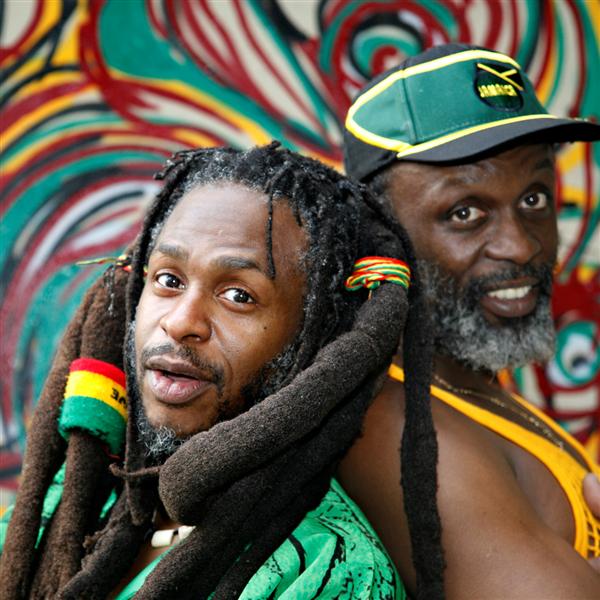

Pulse shared the stage with Watts' band, Beshara, along with other artists from Birmingham. They decided to perform at the Ray Watts memorial concert, which was held at the Irish Centre. Until February 2001, it had been many years since Pulse had performed in their hometown of Birmingham. In 1997, the band released Rage and Fury. Rastanthology, a 17-song collection of Steel Pulse classics (the 1996 compilation was released on the band's own Wise Man Doctrine label). They recorded The Police's "Can't Stand Losing You" for a reggae compilation of Police tunes that appeared on the Ark 21 label. In 1986, Steel Pulse contributed a version of "Franklin's Tower" on Pow Wow Records' Fire on the Mountain: Reggae Celebrates the Grateful Dead compilation. In 1994, the group headlined some of the world's biggest reggae festivals including Reggae Sunsplash USA, Jamaican Sunsplash, Japan Splash and Northern California annual Reggae on the River Festival. In 1989, the group contributed I Can't Stand it to the soundtrack of Spike Lee's film Do The Right Thing. The lawsuit was later dropped by Steel Pulse.
STEEL PULSE DRIVERS
Their profile was raised further when, in 1992, Hinds challenged the New York City Taxi & Limousine Commission in the Supreme Court, asserting that their cab drivers discriminated against black people in general and Rastafarians in particular. While they still faced criticism at the hands of British reggae fans, in the United States their reputation was growing, becoming the first ever reggae band to appear on the Tonight television show. It was the first recording since the defection of Alphonso Martin, leaving the trio of Hinds, Nisbett and Selwyn. Rastafari Centennial, Steel Pulse's first live record, was recorded live at the Elysee Montmartre in Paris, over three nights in January 1992, and dedicated to the hundred year anniversary of the birth of Haile Selassie. Their next move was to MCA for State of Emergency (1988), which retained some of the synthesized dance elements of its predecessor. Steel Pulse released Babylon The Bandit in 1985, for which the band won a Grammy award. Babylon the Bandit was consequently weakened, but did contain "Not King James Version". However, Elektra chose to take a leaf out of Island's book in trying to coerce Steel Pulse into a more mainstream vein, asking them to emulate the pop-reggae stance of Eddy Grant. A further definitive set arrived in Earth Crisis in 1984. In 1982, Steel Pulse switched to Elektra Records, and unveiled their most consistent collection of songs since Handsworth Revolution with True Democracy, distinguished by the Garvey-eulogizing 'Rally Round' cut. Tom Terrell, who would later serve as their manager, was instrumental in masterminding a Steel Pulse concert on the night of Bob Marley's funeral, which was broadcast live around the world from the 9:30 Club, 930 F Street, N.W., Washington, D.C., on. The band made their US concert debut at the Mudd Club in New York in 1980. However, despite critical and moderate commercial success over three albums, the relationship with Island Records had soured by the advent of their third album, Caught You (released in the US as Reggae Fever). Their debut album, Handsworth Revolution (recorded in 1977 and released in early 1978), was part the evolution of roots reggae outside Jamaica.

By this time their ranks had swelled to include Selwyn Brown (keyboards), Steve "Grizzly" Nisbett (drums), Alphonso Martin (vocals, percussion) and Mykaell Riley (vocals). Their first release for Island was the "Ku Klux Klan" single, a tilt at the evils of racism, and one often accompanied by a visual parody of the sect on stage. Eventually they found a more natural home in support slots for Burning Spear, which brought them to the attention of Island Records. Īligning themselves closely with the Rock Against Racism organization and featuring in its first music festival in early 1978, they chose to tour with sympathetic elements of the punk movement, including the Stranglers, XTC etc. During the popularization of punk rock in the mid- 1970's, Steel Pulse began to play punk venues such as the Hope and Anchor in London and The Electric Circus in Manchester in 1976. They were initially refused live dates in Caribbean venues in Birmingham due to their Rastafarian beliefs. They followed it with "Nyah Luv" for Anchor. The band formed in 1975 their debut single release "Kibudu, Mansetta And Abuku" arrived on the small independent label Dip, and linked the plight of urban black youth with the image of a greater African homeland. Basil Gabbidon and David Hinds became inspired to form Steel Pulse after listening to Bob Marley and The Wailers' Catch a Fire.


 0 kommentar(er)
0 kommentar(er)
